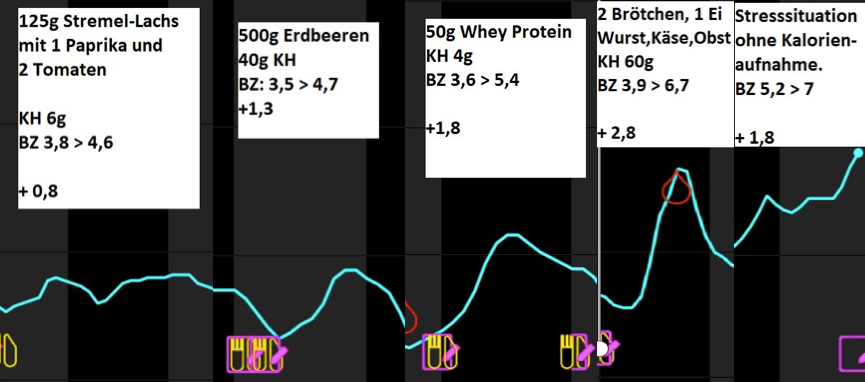Everyone who knows a bit about nutrition knows that the consumption of carbohydrates elevates blood sugar. Next to carbohydrates and also proteins there are five hormones that can also elevate blood sugar. Independent of carbohydrate consumption.
What is blood sugar?
From a chemical perspective blood sugar is not just some sugar its specifically glucose. There are other types of sugars in the blood, too, just in smaller amounts.
What do we need blood sugar for?
Blood sugar is an important energy transmitter and source for our cells. Cells take up sugar from the blood. This sugar will then be transformed through glycolysis and citric acid cycle to the universal energy source ATP which supplies all our cells with energy.
Where does blood sugar come from?
There are three primary sources of blood sugar:
1. From food - What we eat is most of the time not straight glucose. What we eat is often sucrose or "regular sugar", fructose from fruit or high fructose corn syrup, lactose from dairy or starch such as rice and potato. All these carbohydrates are made of one or more molecules of primarily glucose bound together as a chain. During digestion these long chains will get broken up in shorter chains and then single molecules, primarily glucose, which will then be absorbed through the intestinal wall into the blood.
2. From glycogen stores - Glucose will be stored, primarily in liver and muscles as glycogen. Glycogen is the storage form of glucose. If we don't eat for an extended period of time glycogen from the liver will be released back into the blood stream to regulate the blood sugar level.
3. Through gluconeogenesis - glycogen stores will only last a certain time. If we don't eat for a prolonged time and deplete out glycogen stores in the liver another mechanism to regulate blood sugar is the bodies ability to make sugar from proteins and fats. This process is called gluconeogenesis. Its also only very small amounts of glucose to be made though.
What regulates blood sugar?
There are five primary hormones that can elevate blood sugar. There is only one hormone that can lower it though. The primary reasons for this are that a low blood sugar is far more dangerous for the body in the short term and that over the last few thousands of years a shortage of food was much more common than an excess like we have today on many parts of the world
Insulin – lower blood sugar – Insulin is also called the energy storage hormone. It regulates the influx of glucose into a cell and lowers blood sugar that way. Insulin increases glycogen stores in liver and muscle. And insulin inhibits gluconeigensis from proteins. Insulin does also potentially increase body fat though.
Cortisol – elevates blood sugar – Cortisol helps to avoid low blood sugar. It directly and indirectly increases a release of glucose from glycogen stores and facilitates gluconeogensis.
Glucagon – elevates blood sugar- Glucagon increases blood sugar and is a direct antagonist to insulin it that manner. Glucagon act proportionately to cortisol.
Adrenaline and Noradrenaline – elevate blood sugar – These two hormones made by the adrenals and part of a group called catecholamines which are released during times of stress, anxiety, physical activity and other demanding situations.
Somatotropin – elevates blood sugar – also known as growth hormone. Its made in the pituitary gland. And also elevates blood sugar.
As explained in the article "Low blood sugar - a different form of stress" in detail, especially in longer periods of not eating cortisol is the primary force in stabilizing blood sugar. And thats the mechanism through which cortisol also leads to blood sugar fluctuations.
The picture above the article shows a few examples of blood sugar reactions to certain foods and scenarios from YPSI A-Licence Trainer Michael Haase based on the CGM, short for continuous glucose monitoring. CGM is a small tool that measures blood sugar level every 5 minutes 24 hours a day for up to 6 days via a small subcutaneous needle. This allows to create a detailed curve of blood sugar fluctuations and reactions to certain foods and scenarios. From left to right the above examples show:
Salmon with bell peppers and tomatoes - based on the motto "Eat Animal for Breakfast" this breakfast choice is one I recommend and use a lot. In the example above this moderately fast-digesting protein combined with such healthy fats and vegetables leads to the lowest increase and lowest fluctuation in blood sugar.
Strawberries – Despite their higher carbohydrate content of 40g contained in this 500g portion the effect on blood sugar is quite low.
Whey protein – Most likely the biggest surprise for many so far. Despite the low carbohydrate content of the whey protein shake of just 4g the higher amount of fast-digesting proteins has significant effect on blood sugar.
Bread with ham & cheese and some fruit - A combination thats considered a "classic breakfast" in Germany, with a total of 60g of carbohydrates in this case has a significant effect on blood sugar.
Stress paired with no food consumption – No food paired with a high stress situation at work has major impact on blood sugar as seen in the example above. This increase in blood sugar is based on the hormonal reaction to stress independent of food consumption.
Summing this up, the most important point to take away is that stress independent of the consumption of proteins and carbohydrates has a severe effect on blood sugar level and blood sugar fluctuations. Therefore managing the cortisol level through regular meals and of course sleep, work-life balance and optimal micronutrient levels is crucial to stabilize the blood sugar. As a key component to achieve the primary goal which is to maximize and sustain performance and results.
All the Best optimizing your blood sugar!
Picture: A few examples of blood sugar reactions to certain foods and scenarios from YPSI A-Licence Trainer Michael Haase based on the CGM.

